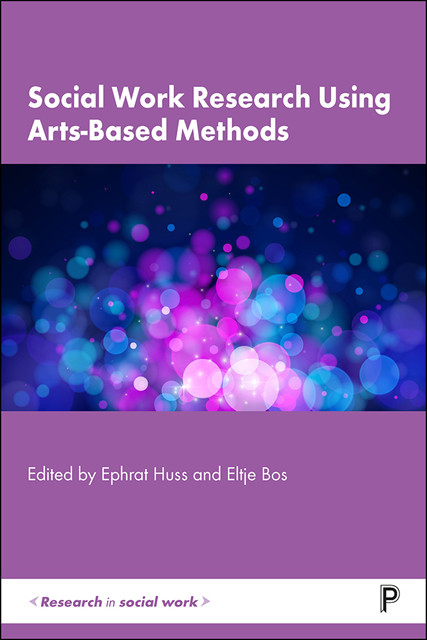Book contents
- Frontmatter
- Dedication
- Contents
- List of figures and tables
- Notes on contributors
- Introduction
- Section I Arts-based research as a method to understand and give voice to marginalised groups
- Section II Using arts-based research to listen to, and give voice to, children in social work
- Section III Arts-based research as a way for researchers and community members to understand communities
- Epilogue
- Index
3 - Arts-based methods to co-create knowledge and reconstruct power relations with marginalised women in and through research
Published online by Cambridge University Press: 13 October 2022
- Frontmatter
- Dedication
- Contents
- List of figures and tables
- Notes on contributors
- Introduction
- Section I Arts-based research as a method to understand and give voice to marginalised groups
- Section II Using arts-based research to listen to, and give voice to, children in social work
- Section III Arts-based research as a way for researchers and community members to understand communities
- Epilogue
- Index
Summary
Academic and professional knowledge have dominated the history of social work research and practice. As a result, new knowledge has been grafted predominantly onto an existing base of professional authority and expertise. Arts-based research is emerging as an alternative approach to knowledge production, broadening the understanding of how scientific evidence is created and who is in the position to create it (Boydell et al., 2012). It is intended to open space for deliberately engaging with voices from the margin, hence rendering it a meaningful approach to advance social inclusion and social justice in and through social work research. In this chapter, we draw on our experience with arts-based research projects to contemplate this potential and to contribute to a critical dialogue regarding the impact of arts-based research on power relations and structures in social work academia and practice. We start by briefly introducing our research collective, explaining our rationale for working with arts-based methods, and describing two projects in which visual arts were used. We continue this chapter by elaborating on the merits and challenges of this methodology in relation to co-creating knowledge and altering power relations, derived from our own experiences in relation to the strand of literature on artsbased research.
Introduction
Background of the research collective and arts-based research projects
EQUALITY//ResearchCollective, embedded in Artevelde University of Applied Sciences, member of the Ghent University Association (AU GENT) seeks to respond to social inequality and exclusion by initiating research from within a human rights and quality of life framework. Specific attention is directed towards involving people in socially vulnerable situations and their perspectives, as well as to establishing participatory approaches whereby co-creation with participants is key to addressing power relations in society. In several projects we employ arts-based methodology to pursue this objective.
This choice is grounded in the understanding that research plays a crucial part in knowledge production and dissemination, but also risks being an elitist structure in which social inequalities and (mis)representations are (re)produced by voices from the centre. The experiences and stories of citizens living in socially vulnerable situations are rarely sought in research, hence excluding their perspectives from knowledge frameworks (Mizock et al., 2014).
- Type
- Chapter
- Information
- Social Work Research Using Arts-Based Methods , pp. 33 - 44Publisher: Bristol University PressPrint publication year: 2022

